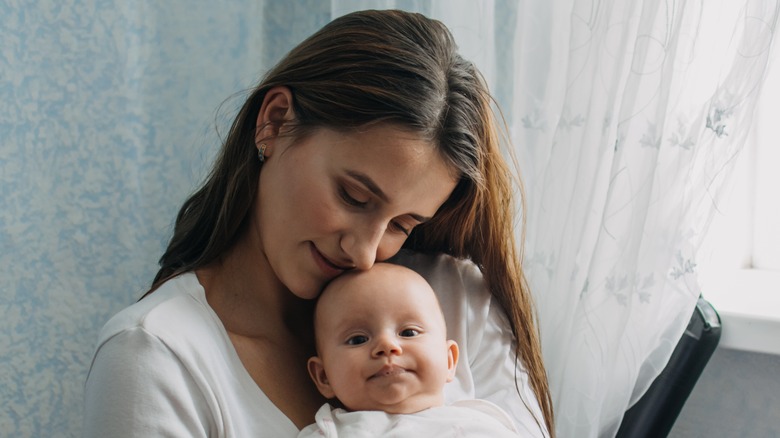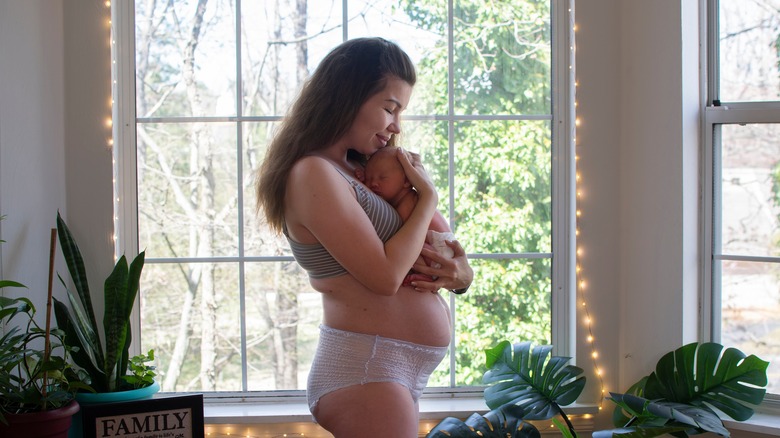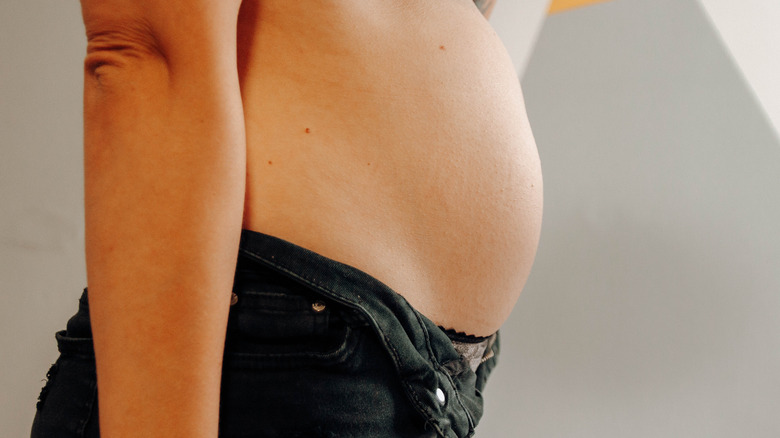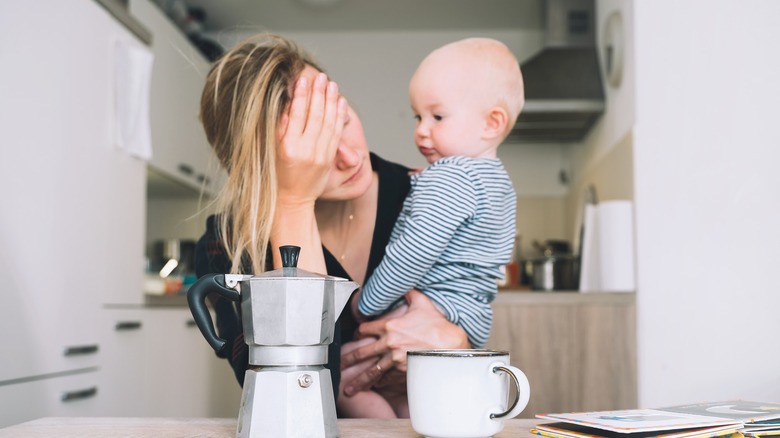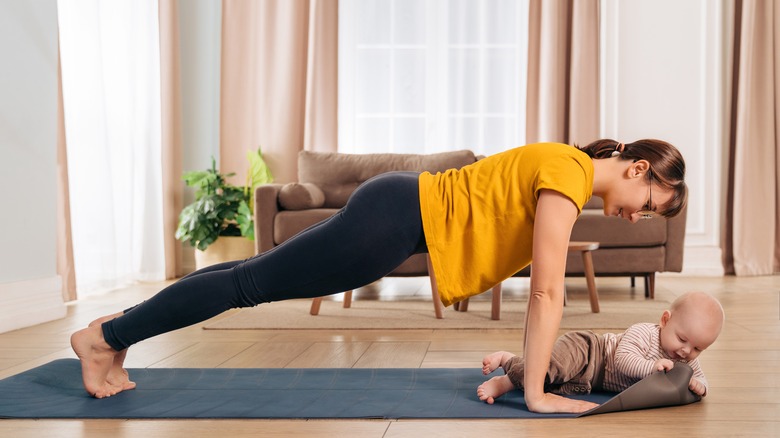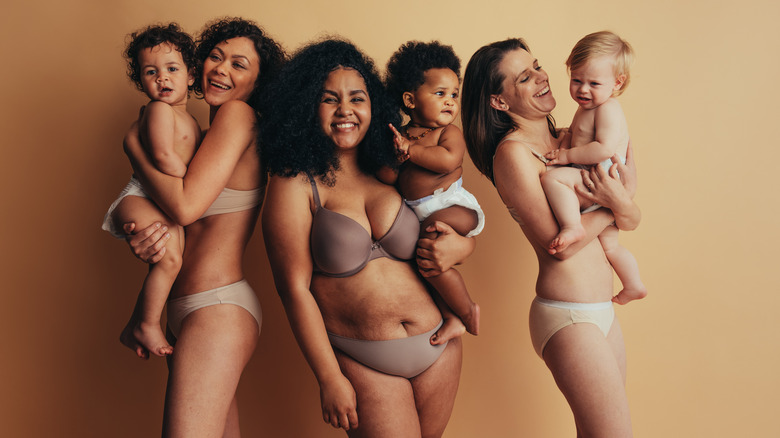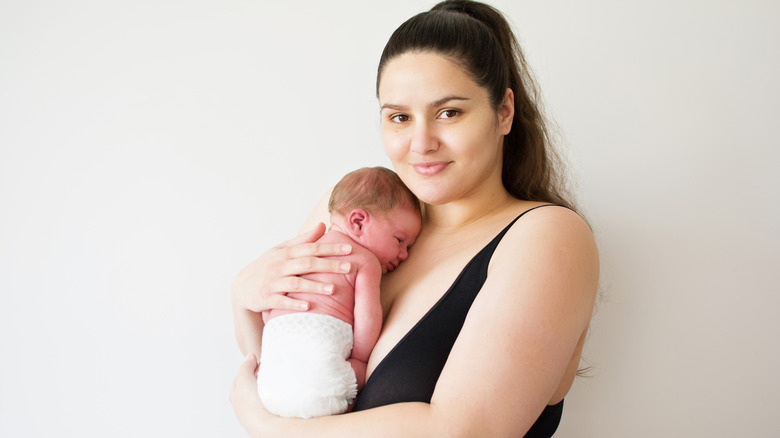How To Fall In Love With Your Postpartum Body
New parenthood can be a time of joy, excitement, and new experiences as you get to know your baby, but it also comes with many changes. Becoming a parent is a shift in your stage of life, and it can bring difficult emotional and physical adjustments. This is true whether it's your first baby or you've had other children. The postpartum period is always going to be transformative.
For many mothers, one of the challenges during this time is feeling comfortable in their postpartum body. Although tv shows, social media, and celebrities may make it seem that bodies snap back to their pre-pregnancy shape and size instantly, this is not the case. Childbirth is a huge physical ordeal that often comes with healing time and looks different for everybody. This is normal and healthy.
Rather than stressing about losing weight or looking a certain way, it's better to accept your body as it is and learn to embrace the changes. By shifting your perspective, taking care of yourself, and following some of these professionally recommended tips, you can learn to love and appreciate your postpartum body rather than judge it.
Forget about bouncing back
Too many people feel the pressure to "bounce back" after giving birth. It's a strange phenomenon when after carrying and growing a baby for nine months and then giving birth, women are expected to return to the same body type they had before pregnancy in a matter of months or even weeks. The expectation is neither healthy nor realistic. A 2017 study found that media depictions of celebrity moms looking toned after birth left 46 percent of women feeling self-conscious, depressed, and hopeless. For many new moms, this pressure can lead to cutting back on calories or excessive exercise. While exercise and healthy eating are great, the emphasis on looking trim can lead to taking those habits too far and developing postpartum eating disorders, which can be quite dangerous.
What's more, someone's size or how toned they look after giving birth is not a good indicator of recovery. Everyone is different, and pregnancy and childbirth will affect people differently. Sharon Oakley spoke to BBC about her postpartum experience. As a runner, Oakley did lose her "baby weight" rather quickly and received many compliments about her speedy recovery. But, she had difficulties that weren't as easy to see. "It is a very strange part of our culture where we gauge a woman's postpartum period in terms of how they look, rather than how they're feeling," Oakley said. "I look fine – but I have these birth injuries that I'm still navigating every day."
Buy clothes that fit instead of stressing over old clothes
After giving birth, you may be excited to finally fit into your pre-pregnancy wardrobe again. However, this may take months or not happen at all. Rather than stressing over trying to button your old jeans, buy comfortable clothes that fit your current body, lifestyle, and taste. It may not be fiscally possible to go out and buy an entirely new wardrobe, but getting a few staple pieces that fit and make you feel good can make a huge difference in your confidence.
Often people hold onto clothes they no longer fit into or "skinny clothes" as motivation to lose weight. However, the effect is usually more discouraging than motivational. Speaking about this tendency to fixate on "skinny clothes," clinical psychologist Juhee Jhalani, Ph.D., told Livestrong that trying to fit into too small clothes often makes people feel "less than" and reinforces a thin ideal. "It's OK to aspire to be fit, healthy, and attractive," Jhalani said but encouraged separating that goal from thinness or fitting into a specific dress size.
After giving birth, your weight may fluctuate quite a bit, and you could eventually fit back into your old clothes. So, you may not want to throw away all your favorite outfits right away. But, it could be helpful to put anything that doesn't fit in storage and keep it out of mind while you focus on healing and adjusting to life with your baby.
Don't compare yourself to celebrities' postpartum bodies
While media outlets may applaud celebrities who "bounce back" quickly after giving birth, it's important not to compare yourself to them or set unrealistic expectations. Most of us don't have access to all the personal trainers, expensive diet plans, and even procedures celebrities do to achieve their post-baby body. So, it's unfair to expect yourself to look exactly like them, especially while you're taking care of an infant.
The expectation of achieving the perfect post-baby body even gets to many celebrities. After giving birth and seeing people comment on how she looked, Halsey took to her Instagram to give an honest look at her postpartum body and how she was feeling. "No matter what I do people are going to talk about my body. It is a confusing symptom of being in the public eye so rather than complain I am going to give you something real to talk about," the "Without Me" singer wrote. "I have no interest in working out right now. I'm too tired and too busy playing with my darling son ... I do not want to feed the Illusion that you're meant to feel and look 'great' immediately postpartum ... I will never have my 'pre-baby body back' no matter how it changes physically because I have now had a baby! And that has altered me forever; emotionally, spiritually, and physically. That change is permanent."
Remember that everyone is different
Although it's easy to compare yourself to celebrities, other mother's in your community, and people on social media, try to remember that your experience is unique. Your body, baby, and postpartum journey will not look exactly like someone else. There are many reasons postpartum recovery might take longer. For example, if you had a cesarean section, your body will be recovering from pregnancy as well as major abdominal surgery. There are a variety of other medical reasons your recovery may look different. Lifestyle differences, such as if you have other kids or support in childcare, can also make a huge difference.
Not comparing yourself to others is easier said than done, though. Some ways to try to stay away from that mindset are to reach out to people who support you and don't put pressure on your recovery. If you notice yourself struggling a lot with self-doubt or sadness, consider contacting a mental health professional. If a lot of your comparison is coming from social media, try unfollowing or muting the accounts triggering those feelings and replace them with ones that make you feel good about yourself, or take a break from social media altogether.
Take time for self-care
With a new baby to care for, limited time, and sleep deprivation, it's easy to let your needs fall to the bottom of your priority list, but looking out for yourself is beneficial in many ways. Southern New Hampshire University reported that having a self-care routine has been proven to reduce instances of anxiety and depression. It also increases happiness, improves energy levels, and reduces frustration. Although self-care may seem like one more thing to add to your to-do list, taking a little time for yourself will help you manage all aspects of your life and feel more like yourself.
If you feel you don't have the time for self-care, remember there are many ways you can work this into your daily routine. Self-care isn't just about face masks or bubble baths; it's anything you do to care for yourself physically and mentally. Instead of seeing self-care as a huge undertaking, try to frame it as small things you can do to take care of yourself throughout the day. Self-care could mean anything from taking the time to wash your face, fix a cup of tea, or watch your favorite tv show. To find time for yourself in your busy schedule, the Mayo Clinic recommends delegating some tasks to your support system and keeping organized so you don't get as overwhelmed.
Introduce light exercise into your routine
Childbirth is a huge ordeal, both mentally and physically, and exercise can help recovery in both regards. According to the American College of Obstetricians and Gynecologists, exercise boosts energy, promotes better sleep, reduces stress, and has even been found to help prevent postpartum depression.
But this doesn't mean you should dive into a rigorous exercise regimen right after birth. Your body is healing, and it's important to take things slow and go at your own pace. When first introducing exercise, it will also help to focus on regaining strength and how it feels rather than losing weight. ACOG recommends starting with some postpartum exercises to strengthen core muscles and slowly working in other types of moderate-intensity exercises. For some basic postpartum exercises to start with, try the pelvic tilt, kegel exercises, and happy baby pose.
Remember that your exercise routines and timeline may vary broadly depending on the type of birth you had. As Dr. Mundy told Houston Methodist, "When it's safe for you to start exercising again depends on how your pregnancy and delivery went. If you had an uncomplicated pregnancy and normal vaginal delivery, you can start doing light exercises as soon as a few days after giving birth. If you experienced a complicated pregnancy or had a cesarean section, your body will likely need more time." For guidance on what your exercise journey might look like, speak to your doctor.
Focus on what your body has done (not how it looks)
Instead of focusing on how your appearance might have changed from pregnancy, try to remember all your body has accomplished and still is doing for you and your baby. Through pregnancy, your body has nurtured an embryo to grow into your baby. You provided a home and sustenance for your baby before it was even born. That's nine months of work, not to mention the extreme accomplishment of giving birth. When you consider all you've done and what your body is healing from, it's perfectly understandable that it's changed.
And if you're breastfeeding, your body is still sustaining your baby even after birth. According to McLaren, breastfeeding has many healing benefits for the mother and the baby, including helping with bonding, reducing the risk of postpartum depression, and lowering the risk of SIDs. But, even if you aren't breastfeeding, taking care of your baby in whatever way works for you and your family is a huge accomplishment. Try to remember how much you're doing for yourself and your baby, and give yourself a pat on the back for those huge accomplishments.
Work towards body neutrality
For most people, their body changes a lot after childbirth. Feeling comfortable and confident in your own skin is already a challenge when unrealistic beauty standards bombard us on a daily basis. Add to that adjusting to your postpartum body, and you have a recipe for a dip in confidence. If you're struggling to accept your body, then loving your body might feel like a leap. That's exactly why some experts have instead started promoting the concept of "body neutrality."
Anne Poirier is a body-image coach and author of "The Body Beautiful," who popularized the term "body neutrality." She explained the concept to The New York Times, saying, "Body neutrality prioritizes the body's function, and what the body can do, rather than its appearance. You don't have to love or hate it. You can feel neutral towards it." If you're struggling to accept your body or stuck in feelings of self-hatred, shifting from that mindset to self-love may feel disingenuous or impossible. Poirier recommends body neutrality as a more realistic perspective to shift.
Body neutrality and awareness and acceptance of your body's current abilities and needs can also help you balance exercise and food choices. As a personal trainer, Lauren Leavell said, "Body neutrality is about reframing movement as a lifelong practice that will change with you. Bodies change, abilities change, and it's important to listen to your current body, not what you think you should be able to do."
Seek out a support system
While taking time for self-care, exercise, and other healthy habits can be an important part of your healing journey, it's difficult to find time for any while caring for a newborn. Having a new baby in the house often means sleep deprivation, stress, and many more challenges. Taking care of everything on your own can feel next to impossible, and you shouldn't have to. Finding a support system and community for yourself and your baby can make a huge difference.
This support system can come in many different forms depending on your situation. Your partner, family, friends, coworkers, or other new parents could all be vital. Having people in your corner can make a huge difference in your mental and emotional state. Allowing members of your community to take some chores off your plate or offer childcare can free up much-needed time for you to do what you need to recover. It's also important to have people supporting you emotionally as you go through life changes.
Unfortunately, a National Parent Survey found that 48% of new parents felt they didn't have the support they needed when stressed. If you don't have family members or friends you can lean on for support, try finding new parent groups in your local community. Libraries and community centers often have info, or you could search for meetings online. Social groups with those going through similar things can feel hugely supportive.
Keep your expectations reasonable
Becoming a new parent is a massive life change. Not only are you recovering from the physical changes that come with pregnancy and birth, but your lifestyle is completely altered by the little human you're taking care of. Expecting yourself to instantly go back to the person you were before is unfair and sets you up for disappointment. It's normal for your body to change, and you shouldn't have to worry about losing the "baby weight."
How much weight you lose, how quickly, and if you lose weight at all depends on a lot of factors, so it's best not to put too much pressure on yourself to meet some arbitrary deadline. Shari Lawson, M.D., told Hopkins Medicine, "Your body changes over time; it takes a while to get close to your pre-pregnancy shape and size." Although a lot of mothers will naturally lose some weight before their first postpartum doctor's appointment, most will not be back to their pre-pregnancy weight, and that's not a healthy expectation to put on yourself. Lawson also reminded new mothers that their hormone levels will fluctuate greatly post-childbirth. Because of this, how you feel about yourself, and your body can vary a lot from day to day. Try not to beat yourself up for these changes either, as they're perfectly natural. "Life after a new baby is not going to be the same. There is a steep learning curve in parenthood," Lawson said.
Engage in positive self-talk
Self-talk, or your inner voice, is present throughout the day whether you're aware or not. Psychology Today explains that this inner voice is like a running monologue composed of conscious thoughts and subconscious beliefs. This self-talk determines how you interpret the world and see yourself, so if your inner voice is saying negative things about yourself and your body, that will affect your confidence. Although it may feel cheesy, shifting from negative to more positive self-talk can improve your body image and overall confidence.
Adjusting self-talk can be difficult, particularly if you have a habit of negative self-talk. Health Direct shared these helpful steps to stop negative self-talk. The first is identifying your thoughts. Often this inner monologue is more subconscious, and you may not even be aware of how it's affecting you. Try to be more conscious of the way you think about yourself. Once you're aware of your thoughts, you can work on adjusting them. You can challenge negative perceptions by asking if the thought is true or if it matters. You can put your negative thoughts into perspective by asking if the issue will still matter in a few years or if you'd think badly of someone else for the thing you're criticizing yourself for. Finally, try counteracting that thought with a more positive or neutral perspective. For example, you can shift negative thoughts about your appearance to thinking about what your body has accomplished and is doing for you and your baby.
